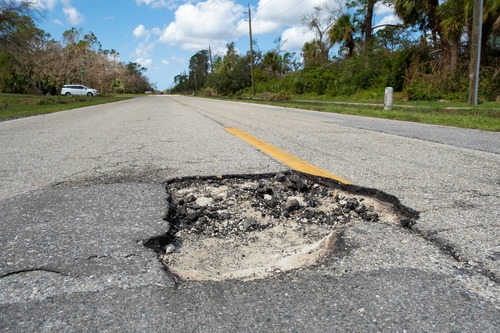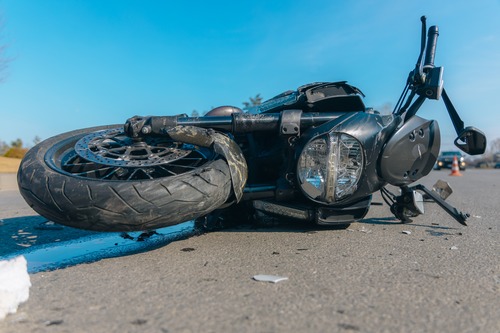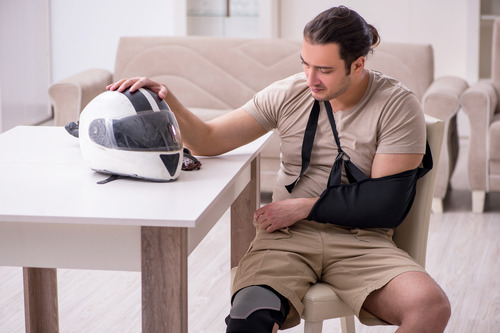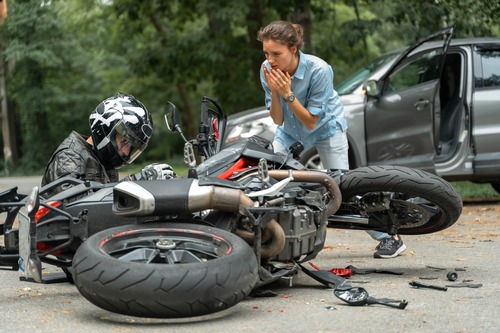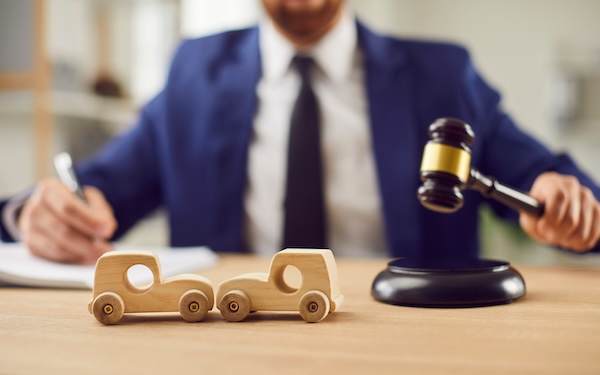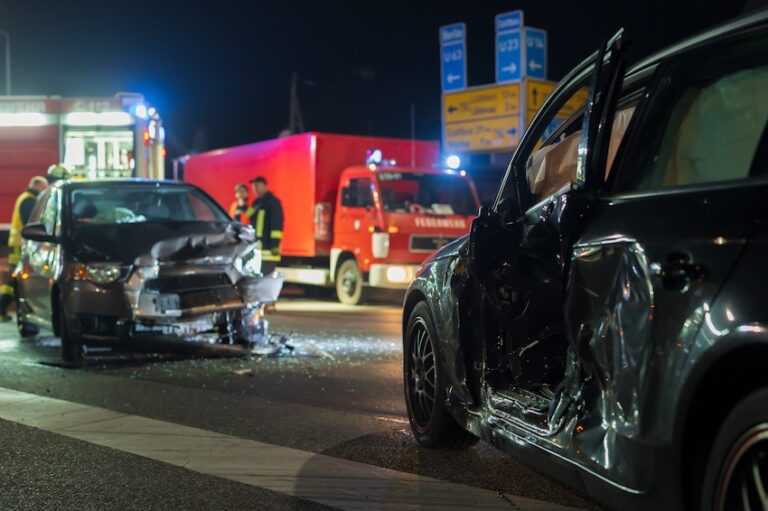At NC Car Accident Lawyers, we understand the challenges you face after a motorcycle accident. Our team is dedicated to helping injured riders across North Carolina recover the compensation they deserve. With experience in handling motorcycle accident cases, we provide personalized attention and aggressive representation to protect your rights. We offer free consultations and work on a contingency fee basis, so you pay nothing unless we win your case.
Motorcycle riders face more risks on the road than drivers of other vehicles, especially when road hazards are involved. Potholes, loose gravel, and poor road maintenance can turn a routine ride into a serious accident with lasting injuries. In North Carolina, determining motorcycle accident liability becomes more difficult due to strict contributory negligence laws.
In this blog, you will learn how road hazards contribute to motorcycle accidents, how liability is determined under North Carolina law, and why working with an experienced North Carolina motorcycle accident lawyer is essential to protect your rights and recover fair compensation.
Common Road Hazards Leading to Motorcycle Accidents
Motorcycle accidents often occur due to road hazards that make it difficult for riders to maintain control. These hazards can cause serious injuries, property damage, and fatal crashes.
Loose Gravel and Debris
Loose gravel is dangerous for motorcycle riders, especially on curves and rural roads. It reduces traction and increases the risk of skidding or sliding. Debris such as tree branches, vehicle parts, or trash can also cause a motorcycle crash. Riders may swerve to avoid debris, leading to a collision or loss of control.
Potholes and Uneven Pavement
Potholes pose a serious risk to motorcycle riders. Unlike cars, motorcycles cannot absorb the impact of a deep hole in the road. Uneven pavement, often caused by temporary repairs or aging infrastructure, can cause a rider to lose balance and fall. These conditions often result in serious injuries and damaged bikes.
Poor Road Design and Maintenance
Bad road design, such as sudden lane drops, lack of warning signs, or sharp curves, increases the chance of motorcycle accidents. In some cases, the government or a private contractor may be responsible for failing to maintain the road. This can affect liability in a motorcycle accident case and may allow the injured party to recover compensation.
Construction Zones
Construction zones are often full of hazards such as loose materials, abrupt lane shifts, and unclear signage. These areas require quick decisions from riders, and any confusion can lead to a crash. Accidents in construction zones often involve third-party contractors, which can affect the legal process and determining fault.
Oil Spills and Slick Surfaces
Oil spills and other slick surfaces reduce tire grip and make it difficult for motorcycles to stop or turn safely. These spills are especially dangerous at intersections and on curved roads. If a spill is caused by another vehicle or poor road maintenance, that party may be held liable in a motorcycle accident claim.
Visibility Hazards
Low visibility caused by poor lighting, blocked signs, or obstructed views can make it hard for motorcycle riders to see and react in time. These hazards often contribute to crashes involving oncoming motorcycles. Proper signage and lighting are necessary to prevent such accidents.
Determining Fault in Accidents Involving Road Hazards
When a motorcycle accident is caused by a road hazard, proving fault requires a clear understanding of who was responsible for the dangerous condition.
Identifying the Responsible Party
Liability in a motorcycle accident case often depends on who had control over the road. This could be a city, county, state agency, or private contractor. If the hazard resulted from poor maintenance, missing signs, or unsafe road design, the party in charge of that area may be held liable. Motorcycle accident attorneys can help injured riders gather evidence and determine who is legally responsible.
Gathering Evidence from the Accident Scene
Accurate documentation is critical in motorcycle accident liability cases. Important evidence includes photos of the road hazard, vehicle positions, and damage to the motorcycle. Eyewitness testimony and accident reports can also help prove liability. Police reports and maintenance records may show that the hazard had been ignored or reported before the crash.
Role of Accident Reconstruction
In serious motorcycle accidents, accident reconstruction experts may be used to analyze how the crash happened. They can examine skid marks, impact points, and debris patterns to support the injured party’s claim. This helps establish liability and shows how the road hazard directly caused the crash.
Traffic Violations and Negligence
Sometimes, multiple factors contribute to a motorcycle crash. If a driver committed a traffic violation while the road was in poor condition, they may share fault. Determining liability in such accidents often involves reviewing legal doctrine and applying North Carolina’s rules for fault.
Insurance and Legal Process
Insurance companies will often try to shift blame to the injured motorcyclist. Under North Carolina’s strict contributory negligence rule, a rider who is found even slightly at fault may be denied compensation. An experienced personal injury attorney can defend against unfair blame and help injured motorcyclists pursue fair compensation.
Proving Motorcycle Accident Liability in Road Hazard Cases
To recover compensation in a road hazard crash, the injured motorcyclist must prove that another party’s negligence directly caused the accident.
Establishing the Existence of a Hazard
The first step is showing that a dangerous road condition existed. This could include potholes, loose gravel, standing water, or debris. Clear photographs, video footage, and physical evidence from the accident scene can help confirm the hazard. Maintenance records or citizen complaints may also support the claim.
Linking the Hazard to the Accident
The injured party must show a direct connection between the hazard and the crash. Accident reconstruction experts may help explain how the motorcycle lost control due to the road condition. Medical records and damage reports can also be used to support the cause and effect relationship between the hazard and the resulting injuries.
Proving Negligence by a Responsible Party
To establish liability, it must be shown that the party in charge of the road failed to act with reasonable care. This could be a government agency, construction company, or private contractor. If they knew about the hazard and failed to fix it, they may be considered legally at fault. In some cases, their failure to warn road users can also support a finding of negligence.
Using Witness Statements and Reports
Eyewitness testimony can confirm how the accident happened and whether the hazard was visible or avoidable. Police reports may include important facts such as road conditions and driver behavior. These documents are often used to support the injured motorcyclist’s version of events in a motorcycle accident claim.
Legal Support in Building a Strong Case
Motorcycle accident attorneys know how to gather and present the right evidence to prove liability. They understand the legal process and how to handle cases involving government agencies or contractors. Their work helps accident victims pursue fair compensation for medical expenses, lost wages, and property damage.
What to Do After a Motorcycle Accident Involving a Road Hazard
Taking the right steps after a motorcycle accident can help protect your health, your legal rights, and your ability to recover compensation.
Get Medical Attention Immediately
Your safety comes first. Even if injuries seem minor, get checked by a doctor right away. Some injuries from motorcycle crashes are not immediately visible. Keep all medical records and bills, as they are critical in a motorcycle accident claim. Medical documentation helps prove the extent of your injuries and related medical expenses.
Document the Accident Scene
If possible, take clear photos of the road hazard, your motorcycle, and the surrounding area. Include any visible injuries, damaged property, and skid marks. Write down everything you remember about how the crash happened. This information will help motorcycle accident attorneys establish liability and determine fault.
File a Police Report
Call the police and report the accident. Ask for a copy of the police report as soon as it becomes available. The report may contain important facts about road conditions, witness statements, and driver behavior. This document is often used in personal injury cases to support your version of events.
Do Not Speak to Insurance Companies Without Legal Advice
Insurance companies often try to limit payouts or shift blame onto the injured party. Do not give recorded statements or accept any settlement before speaking with a personal injury attorney. Under North Carolina’s contributory negligence rule, even small mistakes can cost you your right to compensation.
Contact a Motorcycle Accident Attorney
Legal representation is important in any accident involving a road hazard. NC Car Accident Lawyers has experience with motorcycle accident cases throughout North Carolina. Their attorneys understand the state’s fault laws and how to fight back against insurance companies that deny fair compensation. They offer a free case evaluation and only get paid if you recover damages.
Preserve All Evidence
Keep your damaged motorcycle, helmet, and any protective gear worn during the crash. These items can support your case by showing the severity of the impact and your efforts to ride safely. Share this evidence with your attorney during your case review.
Consult With NC Car Accident Lawyers After Your Motorcycle Accident ASAP!
If you have been injured in a motorcycle accident caused by a road hazard, reach out to NC Car Accident Lawyers for a free consultation. Our experienced North Carolina motorcycle accident attorneys are dedicated to helping injured riders recover compensation for medical expenses, lost wages, and other damages.
Contact us at 864-561-6247 for a free case review today!
